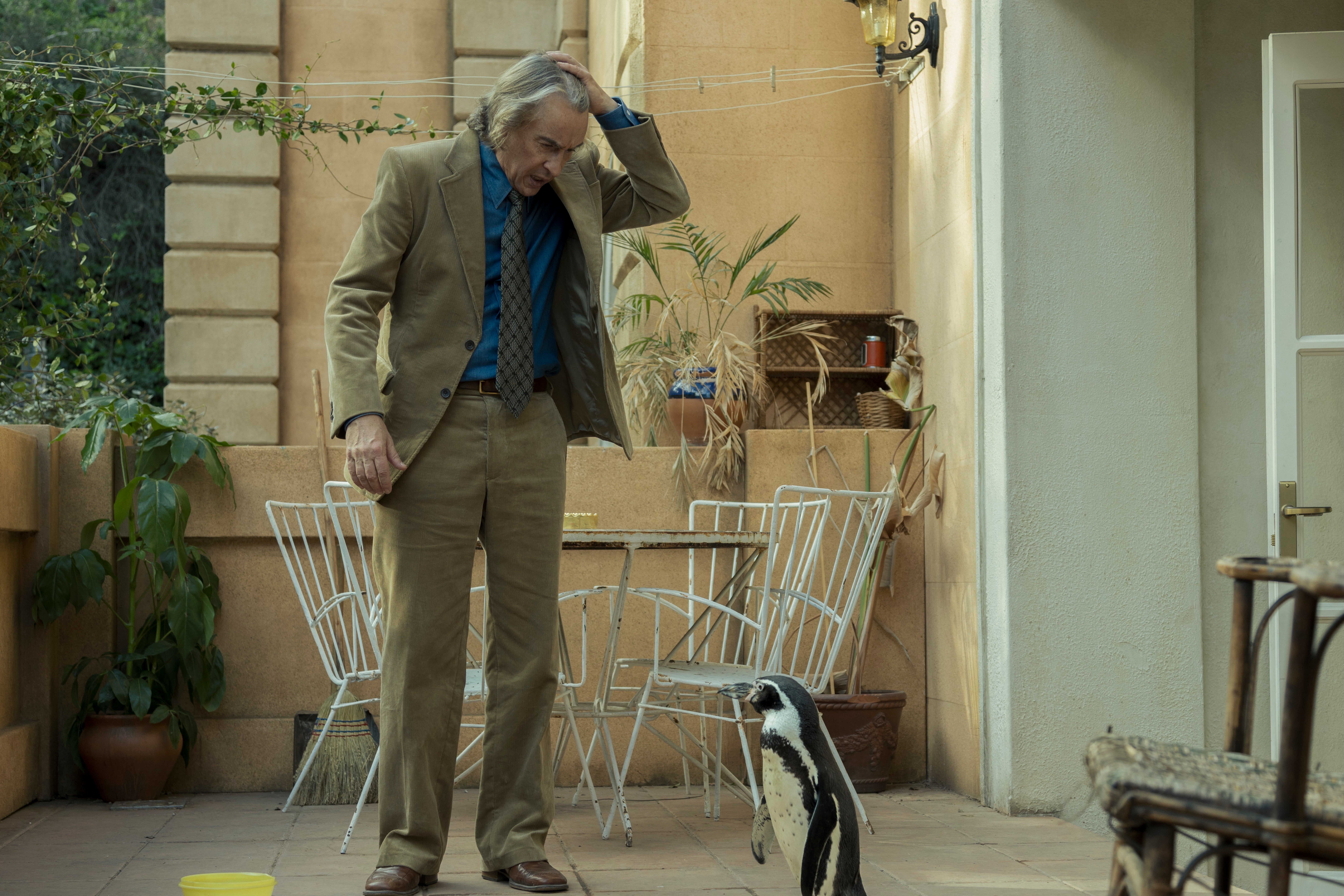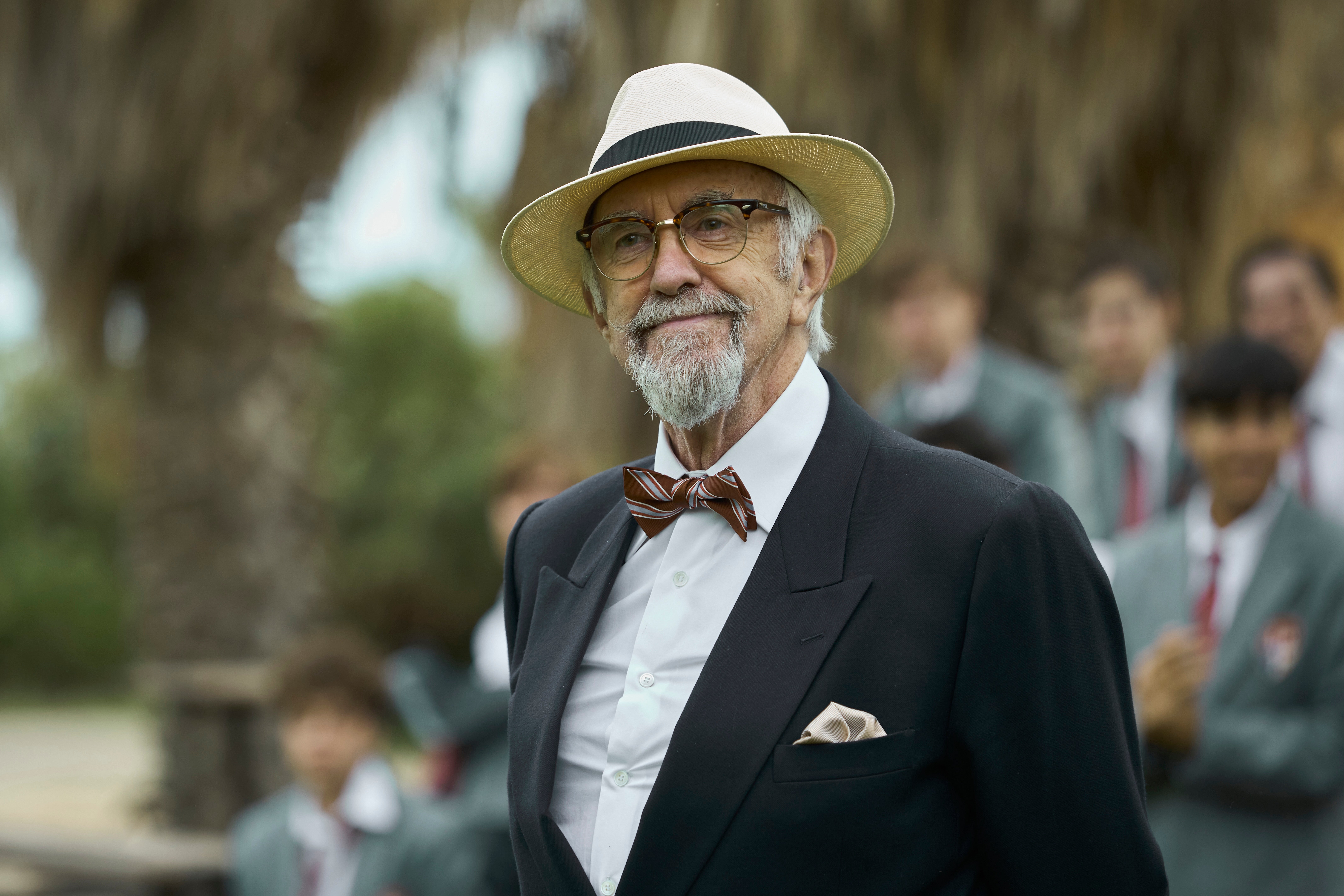ARTICLE AD BOX
Jonathan Pryce is not a fan of penguins. Steve Coogan tells me this with a sort of “eh, can you believe it?” arch to his eyebrows. Pryce confirms as much. “I’m not an animal person,” says the 77-year-old with an air of grave seriousness. So when everyone else on the set of The Penguin Lessons was all too happy to be acting opposite a real-life seabird instead of some inanimate object, Pryce was holding out for CGI. “I’d have preferred a tennis ball screen partner… Penguins, they tend to poop. Projectile poop.”
The penguin is only half the story, though. Set in 1976, the duo’s new film follows a school teacher from Cornwall who is newly arrived in Argentina when he happens across a penguin stuck in an oil slick and saves it from death. At the same time as this unlikely friendship between man and bird is growing, a military coup has gripped the country, launching a brutal dictatorship defined by rampant human rights abuses; dissidents are abducted, never heard from again, and babies are stolen from captured parents.
It’s a convergence of events so random it could only ever happen in real life. Which it did to Tom Michell. He wrote a memoir about his avian pal a decade ago and now, at 73, is watching wide-eyed as his life story is turned into an off-beat drama-comedy starring Coogan, Pryce, and a projectile-pooping Magellanic penguin named Richard. “All of my Christmases have come at once!” Michell tells me in a separate interview alongside the film’s director, Peter Cattaneo.
In adapting his memoir, certain things have shifted. For one, Coogan’s Michell is considerably more grumpy than the man sitting opposite me, who warmed to his penguin buddy instantly. “We wanted to make Tom more cynical in the film because it gives him somewhere to go, but we had to square that away with the real Tom and make sure he didn’t mind being made a bit more unpleasant,” says Coogan.
At 59, Coogan is also considerably older than Michell was when he was an English teacher in Argentina. “I did insist that I could play someone in their twenties but Jeff thought it was a bit of a stretch,” he jokes. Jeff being Jeff Pope, Bafta-winning writer and frequent Coogan collaborator. The pair earned joint Oscar nominations for their work on 2013’s Philomena, which starred Judi Dench as a nun searching for the son she gave up for adoption (also an adaptation of a memoir).
Like that film, The Penguin Lessons walks the thin lines of a particularly complex Venn diagram. It is many things at once; a comedic tale of man and beast, a lesson in Argentinian history, a bildungsroman, and an inquiry into morality and the limitations of self-preservation. As the caustic, disillusioned Michell – who only saves the penguin in order to get a woman into bed – grows to love his cute furry friend, he softens and abandons his apolitical facade, waking up to the brutality of the military dictatorship unfolding around him, which reaches a climax when one of his young housekeepers is abducted.
“Cute furry friend” and “military dictatorship” aren’t words you typically see together in a sentence, which speaks to the balancing act Coogan and co are attempting here by bringing the political subtext of Michell’s book to the foreground. “It’s not a decision we took lightly,” says Cattaneo, known for his light touch in Military Wives and The Full Monty.
That decision was driven by two facts: firstly, that few people in Europe know about this period in Argentina’s history, and secondly, that for many Argentinians, it’s not history at all. An estimated 10,000 to 30,000 people were killed in that time, many of them seized by authorities and never heard from again. Still four decades on and over 2,000 marches later, the mothers of Argentina’s “disappeared” continue to campaign for justice – their white headscarves a symbol of their perennial courage.

“It’s difficult to make this story, which has this dark political background – but also a penguin,” says Cattaneo, “but you take it on and be respectful by doing your homework and learning from historians.” He travelled to Argentina and met with some of those mothers and others whose family had been disappeared. “We were really mindful to try and get it right.”
The result is that The Penguin Lessons is an exercise in tonal equilibrium: the sentimental bits aren’t too schmaltzy and the dark bits aren’t jet-black. Or as Coogan puts it, “The penguin takes the edge off the fascism and stops it being sanctimonious, and the fascism stops the penguin from being too cuddly.”
Penguin aside, it’s hard to ignore the parallels today as reports of US dissidents being detained and arrested continue to flood in amid the continued rise of far-right politicians across Europe. “Although the action took place 50 years ago, perhaps this is a film for our time,” says Cattaneo. “People need to think about the increase in the number of fascist governments that are growing around the world.”
It’s a happy coincidence if it resonates with the public at the end of it, but I’ve never been involved in anything that’s set out to change people’s minds as its intention
Jonathan Pryce
“Mind you,” interjects Pryce. “In every film today, you don’t have to look too hard to find a parallel somewhere.” It’s funny that Pryce – historically a proud socialist – is playing Michell’s pernickety headmaster, someone who prefers to keep politics outside the classroom. For what it’s worth, Pryce says he tries not to be “judgmental” of those who, like his character and very unlike him, choose to keep their nose out of political matters.
“What is interesting,” he says, “is that I read just now on my lunch break that Trump has put enormous tariffs on two islands belonging to Australia, which are solely occupied by penguins.” He and Coogan exchange a glance of pure befuddlement. “I’m just trying to figure out what it is they’ve been exporting that’s supposedly worth billions. Penguins…” He shakes his head.
As much as The Penguin Lessons rings alarm bells about fascism, the film is careful so as not to be didactic. “Entertaining people is a good way to convey ideas,” says Coogan. “On social media you end up being pulled into a soap box, which isn’t always constructive because people become entrenched in their positions. Telling stories is a good way to get people to laugh and to move them. It’s a better way to communicate.”

Pryce agrees, pointing to his 1985 film Brazil as an example. Terry Gilliam’s dystopian masterpiece, also starring Robert De Niro, was a fantastical satire of totalitarian regimes and technological advancement. “We didn’t think that we were making a film that would have political resonance for the next 30, 40 years, but that’s what happened; history catches up with you,” he says. “It’s a happy coincidence if it resonates with the public at the end of it, but I’ve never been involved in anything that’s set out to change people’s minds as its intention,” he says.
As for what “penguin lessons” they’ve taken away from this experience, Coogan says his has been to listen more: “A lot of people have a lot of opinions these days, but not many people listen.” Pryce pipes up, “And myself, I’ve learnt to appear to be listening.” Oh, “and maybe to be a little more tolerant to a penguin”.
‘The Penguin Lessons’ is only in cinemas from 18 April









 English (US) ·
English (US) ·